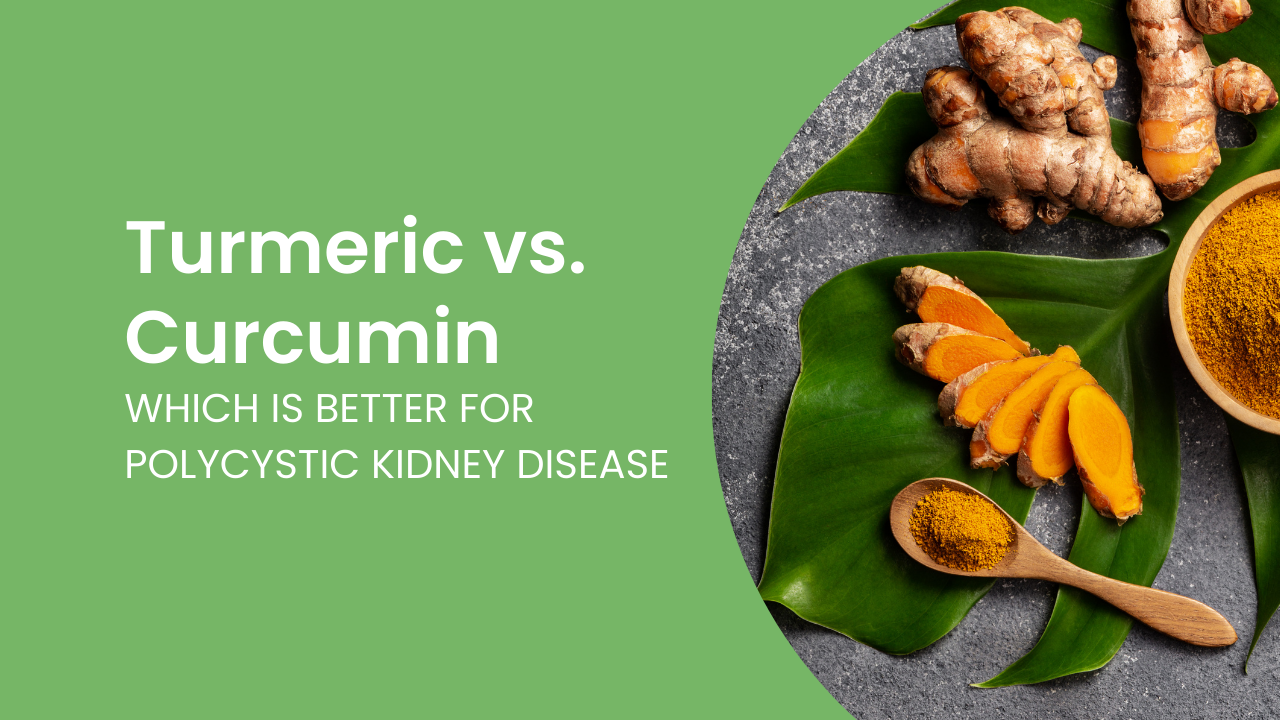
Turmeric vs. Curcumin: Which is Better for Polycystic Kidney Disease (PKD)?
Oct 15, 2024Turmeric and curcumin supplements seem to be everywhere these days, promising all kinds of health benefits. But if you have polycystic kidney disease (PKD) there’s a bit more to think about before adding them to your routine.
Are they the same? Which one is better for PKD? In this blog, we’ll take a closer look at how turmeric and curcumin stack up, what the science says, and which might be the better choice for supporting your PKD Health.
What is Turmeric?
Turmeric is a vibrant yellow root that is closely related to ginger, both belong to the Zingiberaceae herb family. You likely have turmeric, as a ground spice, in your kitchen and use it to add rich color and flavor to dishes like curry.
Medicinal use of turmeric dates back over 4,000 years, particularly in Ayurvedic and Chinese medicine, where it was valued for its healing properties. Traditionally, turmeric has been used to treat inflammatory conditions, as well as a variety of ailments, including digestive issues.
The active compounds in turmeric, known as curcuminoids, are what is responsible for its therapeutic effects. Curcumin, one of three curcuminoids found in turmeric, is the most studied and potent of the group. Ground turmeric, like the spice used in cooking, contains only 2-8% curcuminoids, offering significantly less curcumin when compared to concentrated curcumin extracts.
Turmeric And Oxalates
Ground turmeric has a relatively high oxalate content—about 48 mg per teaspoon. When cooking, go ahead and use turmeric as a spice - don’t fear this. What you don’t want to do is use ground turmeric as a supplement. The amount you'd need to consume daily for therapeutic effects is quite high, increasing your risk of forming a kidney stone. Supplementation with ground turmeric can also increase the concentration of crystals your kidneys have to filter, putting extra strain on them and potentially causing further damage.
What is Curcumin?
Curcumin is the primary active compound in turmeric and is credited for its anti-inflammatory and antioxidant properties. What makes curcumin so beneficial? it's a potent antioxidant that helps neutralize free radicals, which are unstable molecules that can damage cells and contribute to the progression of chronic diseases, including Polycystic Kidney Disease.
Curcumin has also been shown to help reduce inflammation by inhibiting some inflammatory signaling pathways in addition to inhibiting the formation of some inflammatory mediators. Both help to "turn down" inflammation.
When extracted from turmeric, curcumin is highly concentrated. As an extract, curcumin has been extensively studied for its therapeutic potential in managing various health conditions, from heart disease and cancer to neurodegenerative diseases like Alzheimer’s.
Curcumin and Polycystic Kidney Disease
For PKD, curcumin's anti-inflammatory effects are of particular interest because chronic inflammation accelerates cyst growth, increases scarring in the kidneys, and can damage the kidneys over time.
Research on the therapeutic effects of curcumin supplementation is robust, however, studies exploring any benefits for PKD are still in the early stages. Several promising animal studies suggest that curcumin could play a therapeutic role in addressing chronic inflammation and fibrosis (scarring in the kidneys).
In a 2011 preclinical study (this just means an animal study!), curcumin was shown to slow cyst growth in animal models of PKD. The researchers believe that curcumin worked by targeting key pathways involved in cyst formation and inflammation, such as the mTOR pathway which is a known driver of cyst growth. Researchers also found that curcumin’s anti-inflammatory properties may help reduce fibrosis in the kidneys, potentially offering long-term protection against the kidney damage it causes.
Although these studies are exciting, it’s important to note that most of the research so far has been done on animals. This is where most research begins. A randomized controlled trial, published in 2022, explored if curcumin supplements would help improve vascular function in children and young adults with ADPKD. The results showed no significant impact on kidney size or vascular health after a year of supplementation. However, while this particular study didn’t show benefits, there’s still a lot we don’t know, and ongoing research will likely shed more light on whether curcumin can help support PKD health.
What Science Says: The Benefits of Curcumin
A summary of what we know so far:
- Anti-inflammatory effects: Curcumin’s ability to reduce inflammation may help slow the progression of PKD by reducing oxidative stress and preventing chronic inflammation in the kidneys.
- Antifibrotic properties: Curcumin may help reduce fibrosis (scarring) in the kidneys, which could protect against long-term kidney damage.
- Potential to slow cyst growth: Early studies in animal models suggest that curcumin could slow down cyst formation and growth, though more research in humans is needed!
- Support heart health: Curcumin’s antioxidant properties may also support heart and brain health, both of which can be affected by PKD. It may help reduce oxidative stress in the cardiovascular system, supporting better vascular health, blood pressure, and potentially reducing cardiovascular complications.
Turmeric vs. Curcumin Supplements
Remember how curcumin, the active compound in turmeric, only makes up 2-8% of ground turmeric? You would need to take a whole lot of ground turmeric daily to reach therapeutic levels. You’d need to consume about 8 to 9 teaspoons of turmeric powder daily. That’s a lot of turmeric! Not only is that unappealing, and likely bitter tasting, but consuming turmeric in such large amounts adds a heavy oxalate load and can also cause gastrointestinal, GI issues - think nausea and diarrhea.
On the other hand, curcumin supplements contain much higher concentrations of curcuminoids, making it easier to reach therapeutic levels. A big advantage of curcumin supplements is that they don't contain oxalates, you read that right - curcumin, as an extract, is oxalate-free.

Can You Take Too Much?
Yes, yes you can. High doses of both curcumin and turmeric can cause gastrointestinal distress, headaches, and rashes. As a supplement, curcumin is generally recognized as safe (GRAS) when taken in doses ranging from 500-2,000 mg/day.
In my practice as The PKD Dietitian, I use a much tighter protocol for curcumin supplementation ensuring therapeutic levels are achieved. Not everyone I work with starts on curcumin, supplements are targeted based on specific goals and tailored to each individual.
Should You Take Curcumin With PKD?
If you’re considering adding a curcumin supplement to your routine, here are a few things to keep in mind:
- Talk With Your MD & RD: Before starting any supplement make sure to review your medical history, current meds and supplements, labs, and goals with your MD and/or Dietitian. Curcumin can interact with some medications, especially blood thinners and immunosuppressive drugs like those taken post-kidney transplant.
- Consider the dosage: Curcumin is generally safe in doses of 500 to 2,000 mg per day. Higher doses may cause gastrointestinal issues like diarrhea or bloating. Ask your MD and/or Dietitian what the best dose is for you.
- Consider the Supplement: look for 95% curcuminoids plus the addition of black pepper extract, also called Bioperine or piperine. Black pepper enhances curcumin's absorption.
- Timing: curcumin likes fat, it helps with absorption. Make sure to take it with a meal. However, don't take it at the same time as an iron supplement, curcumin can reduce iron's absorption.
- Be patient: Supplements often take time to show results or for you to feel an impact. It might take 8 to 12 weeks of consistent use to start seeing benefits. Know what your goals are with taking curcumin, what benefit you are hoping for, and how you are going to measure if it is helping. These are all areas I work on with clients for safe, and intentional supplementation.
Check out my guide to use before starting any supplement with PKD - four questions before starting any new supplement!
Final Thoughts
While turmeric has its place in the kitchen as a flavorful spice, curcumin is the better option when it comes to supplementation. Curcumin won’t hurt you and may help, especially with inflammation and PKD kidney health. Always consult with your healthcare team and Dietitian before starting any new supplement but also to ensure that your goals with supplementation are defined and you are at a beneficial dose.
If you want help with a review of your supplements, doses, a hurt vs. help analysis, and to get your questions answered, make sure to schedule a Lab & Kidney Health Review with me today!
Happy and Healthy Eating,
Diana, The PKD Dietitian
References
- https://www.ncbi.nlm.nih.gov/pmc/articles/PMC7821343/
- https://pubmed.ncbi.nlm.nih.gov/21187084/
- https://www.ncbi.nlm.nih.gov/pmc/articles/PMC7522354/
- https://pubmed.ncbi.nlm.nih.gov/34907021/
- https://www.ncbi.nlm.nih.gov/pmc/articles/PMC5664031/
- https://www.ncbi.nlm.nih.gov/pmc/articles/PMC7522354/
- https://pubmed.ncbi.nlm.nih.gov/18469248/
- https://www.ncbi.nlm.nih.gov/pmc/articles/PMC10962410/
- https://www.ncbi.nlm.nih.gov/pmc/articles/PMC8823928/
- https://pubmed.ncbi.nlm.nih.gov/28070018/
- https://pubmed.ncbi.nlm.nih.gov/31715259/
- https://www.ncbi.nlm.nih.gov/pmc/articles/PMC5664031/



